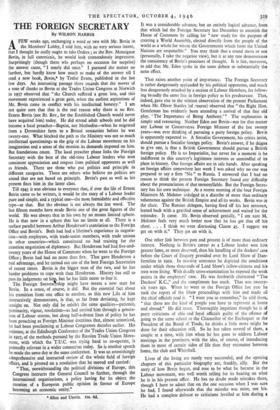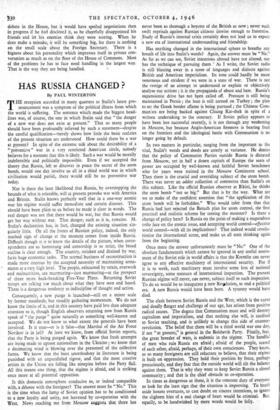THE FOREIGN SECRETARY
By ,WILSON HARRIS
AFEW weeks ago, exchanging a word or two with Mr. Bevin in the Members' Lobby, I told him, with no very serious intent, that I thought he really ought to take Orders ; as the Rev. Monsignor Bevin, in full canonicals, he would look tremendously impressive. Surprisingly (though there was perhaps no occasion for surprise) the answer came, " I nearly did once." I pursued the matter no further, but hardly knew how much to make of the answer till I read a new book, Bevin,* by Trefor Evans, published in the last few days. An interesting passage there records that the mover of a vote of thanks to Bevin at the Trades Union Congress at Norwich in 1937 observed that " the Church suffered a great loss, and this movement experienced a great gain, when the earliest aspirations of Mr. Bevin came in conflict with his intellectual honesty." I am not quite sure that that is the real reason why there is no Rev. Ernest Bevin (not Rt. Rev., for the Established Church would never have acquired him) today. He did attend adult schools and he did become a local preacher—Baptist, not Methodist—when he migrated from a Devonshire farm to a Bristol restaurant before he was twenty-one. What blocked the path to the Ministry was not so much intellectual questionings as the grip of the Labour movement on his imagination and a sense of the mission its demands imposed on him. But foundations count. The local preacher phase links the Foreign Secretary with the best of the old-time Labour leaders who won consistent appreciation and respect from political opponents as well as friends. There are those who put politics and principle in different categories. There are others who believe no politics are sound that are not based on principle. Bevin's past as well as his present fixes him in the latter class.
Till 1945 it was obvious to everyone that, if ever the life of Ernest Bevin came to be written, it would be the story of a Labour leader pure and simple, and a typical one—the most formidable and effective type—at that. But the obvious is not always the last word. The last fifteen months have made Bevin one of the great figures of the world. He was always that in his own by no means limited sphere. He is that now in a sphere that has no limits at all. There is a surface parallel between Arthur Henderson's translation to the Foreign Office and Bevin's. Both had had a lifetime's experience in negotia- tion—with employers, with trade-union members, with trade unions in other countries—which constituted no bad training for the ceaseless negotiation of diplomacy. But Henderson had had five-and- twenty years of the House of Commons when he went to the Foreign Office ; Bevin had had no more than five. That gave Henderson a real advantage, and he turned out one of the best Foreign Secretaries of recent times. Bevin is the bigger man of the two, and he has harder problems to cope with than Henderson. History has still to pass its judgement on hirk, but he has little cause to fear it. The Foreign Secretarirship might have meant a new start for Bevin. In a sense, of course, it did. But the essential fact about his transition from one office to another, as this new Life of him instructively demonstrates, is that, so far from deviating, he kept straight on. Not only did he exhibit the same qualities—patience, pertinacity, vigour, resolution—as had carried him through a genera- tion of Labour storms, but along half-a-dozen lines of policy he has been preaching as Foreign Minister doctrines that, almost unnoticed, he had been proclaiming at Labour Congresses decades earlier. His estimate, at the Edinburgh Conference of the Trades Union Congress in 1927, of the methods pursued by the Russian Trade Union Move- ment, with which the T.U.C. was trying hard to co-operate, is Pointedly relevant in a wider connection today. So is another speech he made the same day at the same conference. It was an astonishingly comprehensive and instructed review of the whole field of foreign affairs, and it pivoted on a resolution that he moved and carried: " That, notwithstanding the political divisions of Europe, this Congress instructs the General Council to further, through the international organisations, a policy having for its object the creation of a European public opinion in favour of Europe becoming an economic entity."
* Allen and Unwin. los. 6d. It was a considerable advance, but an entirely logical advance, from that which led the Foreign Secretary last December to astonish the House of Commons by calling for " new study for the purpose of creating a World Assembly, elected directly from the people of the world as a whole for whom the Governments which form the United Nations are responsible." You may think that a sound move or not (personally, I take the negative view), but it at any rate demonstrates the consistency of Bevin's processes of thought. It is fair, moreover, to add that Mr. Eden spoke in the same debate to substantially the same effect.
That raises another point of importance. The Foreign Secretary is rather dangerously applauded by his political opponents, and much less dangerously attacked by a section of Labour Members, for follow- ing broadly the same line in foreign policy as his predecessor. That, indeed, gave rise to the wittiest observation of the present Parliament when Mr. Oliver Stanley (of course) observed that " the Right Hon. Gentleman has evidently been attending a revival of that fine old play, ' The Importance of Being Anthony.' " The explanation is simple and reassuring. Neither Eden nor Bevin—nor for that matter any Labour or Conservative Foreign Minister of the last twenty years—was ever thinking of pursuing a party foreign policy. Bevin is apparently expected to. A Socialist Government, his critics insist, should pursue a Socialist foreign policy. Bevin's answer, if he deigns to give one, is that a British Government should pursue a British foreign policy. He is no Imperialist, but never for a moment is he indifferent to this country's legitimate interests or unmindful of its place in history. Our foreign affairs are in safe hands. After speaking on foreign affairs somewhere last week I was asked why no one was prepared to say a firm "No " to Russia. I answered that I had no reason to think the present Foreign Secretary found any difficulty about the pronunciation of that monosyllable. But the Foreign Secre- tary has his own technique. At a recent meeting of the four Foreign Ministers M. Molotov indulged in a diatribe of more than ordinary vehemence against the British Empire and all its works. Bevin was in the chair. The Russian delegate, having fired off his last sentence, leaned back with a gratified sense of achievement and waited for the rejoinder. It came. Mr. Bevin observed genially, " I am sure M. Molotov feels very much better now that he has got that off his chest. . . . I think we were discussing Clause 45. I suggest we get on with it." They got on with it.
One other link between past and present is of more than ordinary interest. Nothing in Bevin's career as a Labour leader won him greater fame, or more deserved, than his handling of the dockers' case before the Court of Enquiry .presided over by Lord Shaw of Dun- ferrnline in 192o. In massive sentences he depicted the conditions under which those thousands of Lord Shaw's teilow-citizens and his own were living. With deadly cross-examination he exposed the weak points in the employers' case. He was forthwith christened " The Dockers' K.C.," and the compliment has stuck. That was twenty- six years ago. When he went to the Foreign Office last year he took the report of the Shaw proceedings with him and made all the chief officials read it. " I want you to remember," he told them, " that these are the kind of people you have to represent at home and abroad." He did more. Thoroughly impatient though he is of party criticisms of able and loyal officials guilty of the offence of going to the same school as the Chancellor of the Exchequei or the President of the Board of Trade, he thinks a little more might be done for their education still. So he has taken several of them, a couple at a time, with him when he has gone to address Labour meetings in the provinces, with the idea, of course, of introducing them to more of certain sides of life than they encounter between home, the club and Whitehall.
Lives of the living are rarely very successful, and the opening chapters of this particular biography are, frankly, silly. But the story of how Bevin began, and rose to be what he became in the Labour movement, was well worth telling for its bearing on what he is in his present office. He has no doubt made mistakes there, though I have to admit that on the one occasion when I was sure he had, I found afterwards that the mistake was mine, not his. He had a complete defence to criticisms levelled at him during a
debate in the House, but it would have spoiled negotiations then in progress if he had disclosed it, so he cheerfully disappointed his friends and let his enemies think they were scoring. When he does make a mistake, it will be something big, for there is nothing on the small scale about the Foreign Secretary. There is a bigness about his personality which impresses itself in private con- versation as much as on the floor of the House of Commons. Most of the problems he has to face need handling in the largest way. That is the way they are being handled.































 Previous page
Previous page